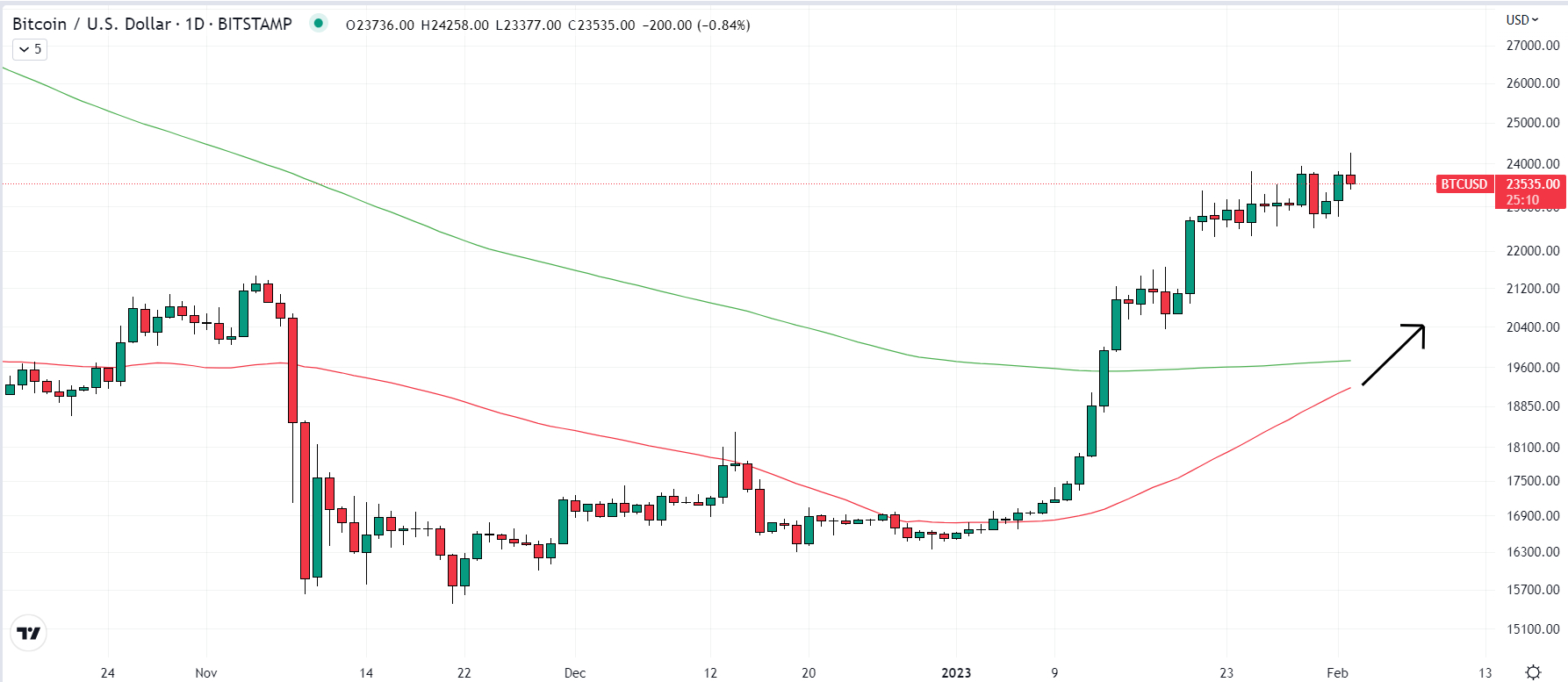[ad_1]

In light of the recent rally that has seen it surge more than 40% since the start of the year, Bitcoin is about to experience only its seventh so-called “golden cross” in the last 10 years. A golden cross is a technical event where the 50-Day Simple Moving Average (SMA) crosses to the north of the 200-Day SMA. Some technicians and traders interpret a golden cross as either a buy signal, or at least a sign that price momentum has shifted in a bullish direction.
Assuming there isn’t a sudden and lasting more than 30% collapse in the price of Bitcoin, the world’s largest cryptocurrency by market capitalization and the first successful implementation of cryptographically secured blockchain technology, Bitcoin’s 50-Day SMA should move above its 200-Day SMA in around one week.

How Has Bitcoin Performed After Golden Cross Events?
If you were to have bought Bitcoin at the time of each of the last seven golden cross events and held for 90 days, you would have been up on your investment four out of seven times. The margin of these gains would have varied wildly between 10-80%. One time out of seven, you would have been flat after 90 days, and on two occasions you would have been down (by 20% and 45%).
If you were to have held for 365 days, you would have been up five out of seven times. Again, the magnitude of gains over this time period varies wildly from 25% to 400%. The two occasions when you would have been down after 365 days coincided with the brutal bear markets of 2014 to early 2015 and of late 2021 into late 2022.
If you tweak the buy signal and say that you only buy when a golden cross happens at the end of a prolonged bear market (not during a choppy bull market), the results are a little different and arguably more bullish. If you bought and held for 365 days after the July 2015, October 2015 and April 2019 golden cross events, you would have returned a respective (roughly) 130, 120 and 25%.
As in these aforementioned occasions, the 50-Day SMA has now been underneath the 200-Day SMA for a prolonged period of time. Imagine that Bitcoin continues to trade around $23,000-$24,000 at the time of the coming golden cross. A 100% gain in the next year is feasible given past performance. So we could feasibly be talking about Bitcoin hitting the mid-$40,000s in early 2024.

Is the Bitcoin Bear Market Over?
Such a recovery in Bitcoin’s price over the next year is easy to imagine when you consider these factors.
Firstly, 2023 is much more likely to be a year of easing financial conditions (which is typically crypto-bullish) than of tightening financial conditions (like 2022 was). That’s because inflation seems to be rapidly falling, as acknowledged by the Fed this week, the Fed is approaching the end of its tightening cycle and may even be cutting rates by the end of the year to support a US economy that could soon fall into recession.
Moreover, Bitcoin’s bear markets historically only last around a year and multiple on-chain and technical indicators are now flashing that the bottom of the 2022 bear market is in (as discussed in this recent article).
All the while, long-term trends in Bitcoin’s wider adoption (i.e. users and investors) remain positive, and the asset should soon gain greater legitimacy as regulators in key markets (like the US, UK and EU) work to bring in comprehensive crypto market legislation. Another golden cross thus adds to a list of arguments as to why the Bitcoin bear market is over.
[ad_2]
cryptonews.com




